 W
WThe Constable of the Tower is the most senior appointment at the Tower of London. In the Middle Ages a constable was the person in charge of a castle when the owner—the king or a nobleman—was not in residence. The Constable of the Tower had a unique importance as the person in charge of the principal fortress defending the capital city of England.
 W
WField Marshal Alan Francis Brooke, 1st Viscount Alanbrooke, & Bar, was a senior officer of the British Army. He was Chief of the Imperial General Staff (CIGS), the professional head of the British Army, during the Second World War, and was promoted to field marshal on 1 January 1944. As chairman of the Chiefs of Staff Committee, Brooke was the foremost military advisor to Winston Churchill, the British Prime Minister, and had the role of co-ordinator of the British military efforts in the Allies' victory in 1945. After retiring from the British Army, he served as Lord High Constable of England during the Coronation of Queen Elizabeth II in 1953. His war diaries attracted attention for their criticism of Churchill and for Brooke's forthright views on other leading figures of the war.
 W
WField Marshal Harold Rupert Leofric George Alexander, 1st Earl Alexander of Tunis,, was a senior British Army officer who served with distinction in both the First and the Second World War and, afterwards, as Governor General of Canada and the first Lord Lieutenant of Greater London in 1965.
 W
WField Marshal Sir Geoffrey Harding Baker, was Chief of the General Staff, the professional head of the British Army, from 1968 to 1971. He served in the Second World War and became Director of Operations and Chief of Staff for the campaign against EOKA in Cyprus during the Cyprus Emergency and later in his career provided advice to the British Government on the deployment of troops to Northern Ireland at the start of the Troubles.
 W
WJohn Berkeley, 5th Baron Berkeley of Stratton, styled The Honourable John Berkeley until 1741, was a British politician, the last of the Bruton branch of the Berkeley family.
 W
WField Marshal Sir John Fox Burgoyne, 1st Baronet was a British Army officer. After taking part in the Siege of Malta during the French Revolutionary Wars, he saw action under Sir John Moore and then under the Duke of Wellington in numerous battles of the Peninsular War, including the Siege of Badajoz and the Battle of Vitoria. He served under Sir Edward Pakenham as chief engineer during the War of 1812. He went on to act as official advisor to Lord Raglan during the Crimean War advocating the Bay of Kalamita as the point of disembarkation for allied forces and recommending a Siege of Sevastopol from the south side rather than a coup de main, so consigning the allied forces to a winter in the field in 1854.
 W
WField Marshal Philip Walhouse Chetwode, 1st Baron Chetwode, 7th Baronet of Oakley,, was a senior British Army officer. He saw action during the Second Boer War, during which he was present at the Siege of Ladysmith in December 1899. He saw action again during World War I on the Western Front, taking part in the First Battle of Ypres, and then in the Sinai and Palestine campaign during which he led his corps at the First Battle of Gaza in March 1917, at the Battle of Beersheba in October 1917 and the Battle of Jerusalem in November 1917.
 W
WField Marshal Stapleton Cotton, 1st Viscount Combermere, was a British Army officer, diplomat and politician. As a junior officer he took part in the Flanders Campaign, in the Fourth Anglo-Mysore War and in the suppression of Robert Emmet's insurrection in 1803. He commanded a cavalry brigade in Sir Arthur Wellesley's Army before being given overall command of the cavalry in the latter stages of the Peninsular War. He went on to be Commander-in-Chief, Ireland and then Commander-in-Chief, India. In the latter role he stormed Bharatpur—a fort which previously had been deemed impregnable.
 W
WCharles Cornwallis, 1st Marquess Cornwallis,, styled Viscount Brome between 1753 and 1762 and known as the Earl Cornwallis between 1762 and 1792, was a British Army general and official. In the United States and the United Kingdom he is best remembered as one of the leading British generals in the American War of Independence. His surrender in 1781 to a combined American and French force at the siege of Yorktown ended significant hostilities in North America. He later served as a civil and military governor in Ireland, where he helped bring about the Act of Union; and in India, where he helped enact the Cornwallis Code and the Permanent Settlement.
 W
WField Marshal Sir Richard James Dacres, was a British Army officer during the nineteenth century. Born into a substantial naval dynasty, he would achieve similar status in the military, commanding three troops of Royal Horse Artillery at the Battles of Alma in September 1854, Balaclava in October 1854 and Inkerman in November 1854, and throughout the Siege of Sevastopol during the Crimean War and eventually rising to the rank of field marshal.
 W
WGeneral Francis Richard Dannatt, Baron Dannatt, is a retired senior British Army officer and member of the House of Lords. He was Chief of the General Staff from 2006 to 2009.
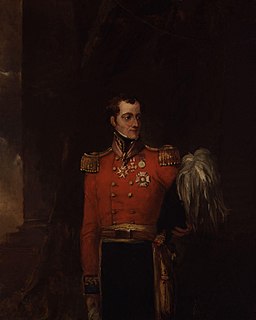 W
WField Marshal Sir William Maynard Gomm was a British Army officer. After taking part in the Anglo-Russian invasion of Holland, he served in most of the battles of the Napoleonic Wars. During the Hundred Days he took part in both the Battle of Quatre Bras and the Battle of Waterloo. He went on to be Commander of the troops in Jamaica and in that role established new barracks at Newcastle, Jamaica, high in the mountains. After that he became Governor of Mauritius and, finally, Commander-in-Chief, India, in which role he introduced promotion examinations for officers.
 W
WFrancis Edward Rawdon-Hastings, 1st Marquess of Hastings, KG, PC, styled The Honourable Francis Rawdon from birth until 1762, Lord Rawdon between 1762 and 1783, The Lord Rawdon from 1783 to 1793 and The Earl of Moira between 1793 and 1816, was an Anglo-Irish politician and military officer who served as Governor-General of India from 1813 to 1823. He had also served with British forces for years during the American Revolutionary War and in 1794 during the War of the First Coalition. He took the additional surname "Hastings" in 1790 in compliance with the will of his maternal uncle, Francis Hastings, 10th Earl of Huntingdon.
 W
WGeneral John Nicholas Reynolds Houghton, Baron Houghton of Richmond, is a retired senior British Army officer and former Chief of the Defence Staff (CDS) of the British Armed Forces. He was appointed CDS in July 2013, following the retirement of General Sir David Richards. He served as Commanding Officer of the 1st Battalion, the Green Howards in Northern Ireland during The Troubles and later became Commander of the 39th Infantry Brigade in Northern Ireland. He deployed as Senior British Military Representative and Deputy Commanding General, Multi-National Force – Iraq during the Iraq War. Later, he became Chief of Joint Operations at Permanent Joint Headquarters and served as Vice-Chief of the Defence Staff until assuming the position of CDS. Houghton retired from the British Army in July 2016, and was succeeded as CDS by Air Chief Marshal Sir Stuart Peach.
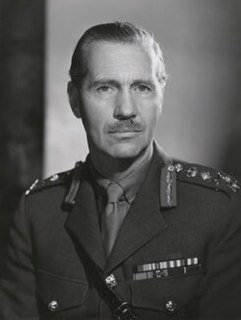 W
WField Marshal Sir Richard Amyatt Hull, was a senior British Army officer. He was the last Chief of the Imperial General Staff (1961–64) and the first Chief of the General Staff (1964–65), and, as such, the professional head of the British Army. He later became Chief of the Defence Staff (1965–67), the professional head of the entire British Armed Forces. He served with distinction during the Second World War, fighting from 1942 to 1945 in North Africa, Italy and Western Europe, became the youngest divisional commander in the British Army, and later advised the British government on the response to the Indonesia–Malaysia confrontation.
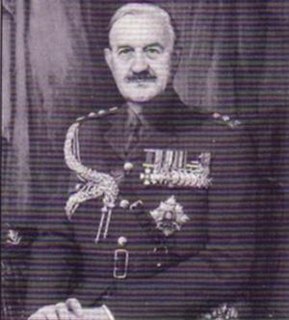 W
WGeneral Sir Peter Mervyn Hunt, was Chief of the General Staff, the professional head of the British Army, from 1973 to 1976. He served in the Second World War and commanded British Forces deployed in response to the Indonesia–Malaysia confrontation. Later in his career he provided advice to the British Government at a time of continuing tension associated with the Troubles in Northern Ireland.
Field Marshal Peter Anthony Inge, Baron Inge,, was the Chief of the General Staff, the professional head of the British Army, from 1992 to 1994. He then served as Chief of the Defence Staff before retiring in 1997. Early in his military career he saw action during the Malayan Emergency and in Northern Ireland and later in his career he provided advice to the British Government during the Bosnian War.
 W
WField Marshal Sir Claud William Jacob, was a British Indian Army officer. He served in the First World War as commander of the Dehra Dun Brigade, as General Officer Commanding 21st Division and as General Officer Commanding II Corps in the Fifth Army. During the Battle of the Somme, his corps undertook the British attack during the Battle of Thiepval Ridge in September 1916 and the subsequent assault on St Pierre Divion during the Battle of the Ancre in November 1916. He remained in command of II Corps for the Battle of Passchendaele in Autumn 1917. After the War he commanded a corps of the British Army of the Rhine during the occupation there and then served as Chief of the General Staff in India. He went on to be General Officer Commanding Northern Command in India before temporarily becoming Commander-in-Chief, India and then taking over as Military Secretary to the India Office.
 W
WGeneral Lord George Henry Lennox was a British Army officer and politician who sat in the House of Commons from 1761 to 1790.
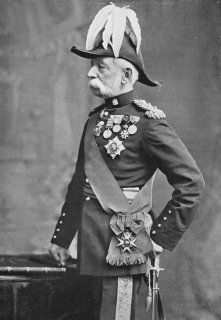 W
WGeneral Sir Daniel Lysons was a British Army general who achieved high office in the 1870s.
 W
WField Marshal Paul Sanford Methuen, 3rd Baron Methuen, was a British Army officer. He served in the Third Anglo-Ashanti War in 1873 and then in the expedition of Sir Charles Warren to Bechuanaland in the mid 1880s. He took a prominent role as General Officer Commanding the 1st Division in the Second Boer War. He suffered a serious defeat at the Battle of Magersfontein, during which he failed to carry out adequate reconnaissance and accordingly his artillery bombarded the wrong place leading to the Highland Brigade taking heavy casualties. He was later captured by the Boers at Tweebosch. After the war he became General Officer Commanding-in-Chief in South Africa in 1908, Governor and Commander-in-Chief of Natal in 1910 and then Governor and Commander-in-Chief of Malta in 1915.
 W
WField Marshal George Francis Milne, 1st Baron Milne, was a senior British Army officer who served as Chief of the Imperial General Staff (CIGS) from 1926 to 1933. He served in the Second Boer War and during the First World War he served briefly on the Western Front but spent most of the war commanding the British forces on the Macedonian front. As CIGS he generally promoted the mechanization of British land forces although limited practical progress was made during his term in office.
 W
WField Marshal Robert Cornelis Napier, 1st Baron Napier of Magdala was a British Indian Army officer. He fought in the First Anglo-Sikh War and the Second Anglo-Sikh War before seeing action as chief engineer during the second relief of Lucknow in March 1858 during the Indian Rebellion of 1857. He also served in the Second Opium War as commander of the 2nd division of the expeditionary force which took part in the Battle of Taku Forts, the surrender of Peking's Anting Gate and the entry to Peking in 1860. He subsequently led the punitive expedition to Abyssinia July 1867, defeating the Emperor Tewodros II of Ethiopia with minimal loss of life among his own forces and rescuing the hostages of Tewodros.
 W
WJames Compton, 3rd Earl of Northampton FRS, was an English peer, politician and author, who fought for the Royalists during the First English Civil War.
 W
WField Marshal Sir George Pollock, 1st Baronet was a British Indian Army officer. He first saw action at the Battle of Deeg and at the Siege of Bhurtpore during the Second Anglo-Maratha War before taking part in the Anglo-Nepalese War. He also commanded the British artillery at the Battle of Prome and at Bagan during the First Anglo-Burmese War. Following a disastrous retreat from Kabul in January 1842 during the First Anglo-Afghan War, the retreating forces became stranded at the small British garrison at Jalalabad and Pollock was appointed Commander of the Force sent to relieve the garrison: he advanced through the Khyber Pass and relieved the garrison in April 1842. He then set about an unauthorised but ultimately successful mission to rescue the British hostages who had been left behind in Kabul prior to the retreat. In 1844 the Pollock Medal was created to commemorate Pollock's achievements: this medal was to be awarded to the "best cadet of the season" at the Addiscombe Military Seminary.
 W
WField Marshal Sir John Wilfred Stanier, was a senior British Army officer who was Chief of the General Staff from 1982 to 1985. He was the first person after the Second World War to become the professional head of the British Army without having seen active service in that war or any subsequent campaign.
 W
WGeneral Sir Frederick Charles Arthur Stephenson, was a senior British Army officer who served as Major General commanding the Brigade of Guards and General Officer Commanding the Home District from 1876 to 1879.
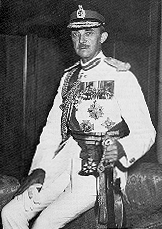 W
WField Marshal Sir Gerald Walter Robert Templer, was a senior British Army officer who fought in both the world wars. As Chief of the Imperial General Staff, the professional head of the British Army, from 1955–58, he was Prime Minister Anthony Eden's chief military adviser during the Suez Crisis. He is also credited as a founder of the United Kingdom's National Army Museum.
 W
WField Marshal Archibald Percival Wavell, 1st Earl Wavell, was a senior officer of the British Army. He served in the Second Boer War, the Bazar Valley Campaign and World War I, during which he was wounded in the Second Battle of Ypres. He served in the Second World War, initially as Commander-in-Chief Middle East, in which role he led British forces to victory over the Italians in western Egypt and eastern Libya during Operation Compass in December 1940, only to be defeated by the German Army in the Western Desert in April 1941. He served as Commander-in-Chief, India, from July 1941 until June 1943 and then served as Viceroy of India until his retirement in February 1947.
 W
WArthur Wellesley, 1st Duke of Wellington, was an Anglo-Irish soldier and Tory statesman who was one of the leading military and political figures of 19th-century Britain, serving twice as prime minister. He is one of the commanders who won and ended the Napoleonic Wars when the coalition defeated Napoleon at the Battle of Waterloo in 1815.
 W
WGeneral Sir William Fenwick Williams, 1st Baronet of Kars was a Nova Scotian military leader for the British during the Victorian era.
 W
WField Marshal Henry Maitland Wilson, 1st Baron Wilson,, also known as Jumbo Wilson, was a senior British Army officer of the 20th century. He saw active service in the Second Boer War and then during the First World War on the Somme and at Passchendaele. During the Second World War he served as General Officer Commanding-in-Chief (GOC-in-C) British Troops in Egypt, in which role he launched Operation Compass, attacking Italian forces with considerable success, in December 1940. He went on to be Military Governor of Cyrenaica in February 1941, commanding a Commonwealth expeditionary force to Greece in April 1941 and General Officer Commanding (GOC) British Forces in Palestine and Trans-Jordan in May 1941.
 W
WField Marshal Sir Henry Evelyn Wood, was a British Army officer. After an early career in the Royal Navy, Wood joined the British Army in 1855. He served in several major conflicts including the Indian Mutiny where, as a lieutenant, he was awarded the Victoria Cross, the highest award for valour in the face of the enemy that is awarded to British and Imperial forces, for rescuing a local merchant from a band of robbers who had taken their captive into the jungle, where they intended to hang him. Wood further served as a commander in several other conflicts, notably the Third Anglo-Ashanti War, the Anglo-Zulu War, the First Boer War and the Mahdist War. His service in Egypt led to his appointment as Sirdar where he reorganised the Egyptian Army. He returned to Britain to serve as General Officer Commanding-in-Chief Aldershot Command from 1889, as Quartermaster-General to the Forces from 1893 and as Adjutant General from 1897. His last appointment was as commander of 2nd Army Corps from 1901 to 1904.
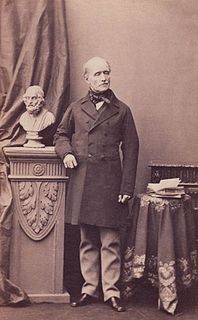 W
WField Marshal Sir Charles Yorke GCB was a senior British Army officer. He fought in many of the battles of the Peninsular War and of the Hundred Days, seeing action as an extra aide-de-camp to Major-General Frederick Adam, commander of the 3rd Light Brigade, at the Battle of Waterloo. After that he became Deputy Commander of the British forces in South Africa during the latter stages of the Eighth Xhosa War. He went on to be Military Secretary, ultimately earning promotion to field marshal for his competence in that role.